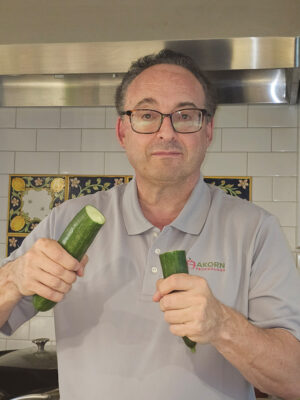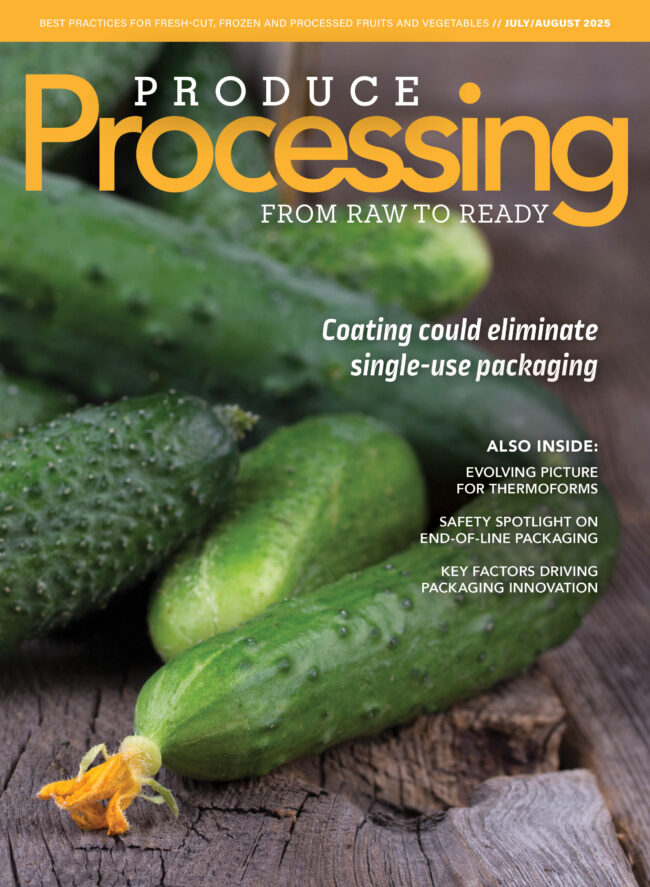Tech takes aim at single-use plastic wraps for cucumbers
As sustainability gains greater currency with consumers and retailers, concerns about single-use plastics in the produce industry are growing.
According to the United Nations’ Environment Program, single-use plastics have considerable environmental, social, economic and health consequences. However, for many items — in particular cucumbers — the plastics also perform an important function in extending shelf life by limiting moisture loss and protecting the product against fungal infection.
So how can this circle be squared? A company called Akorn Technology, based in Berkeley, California, believes it has found the answer.
The company, which specializes in natural coatings for fresh fruits and vegetables, recently debuted a solution it describes as a “breakthrough in sustainable shelf-life extension” for English cucumbers: an edible coating that could replace single-use plastic wraps.
Xander Shapiro, Akorn co-founder and chief operating officer, said the plant-derived coating affects how cucumbers are packed, distributed, sold and consumed.
The coating, Akorn Natural Advantage, forms an invisible barrier that mimics the protective function of plastic to maintain product freshness, crispness and quality with none of the negative consequences associated with single-use plastics.

“Plastic packaging on fresh fruits and vegetables not only contributes to pollution but can also increase food waste by accelerating spoilage and forcing bulk purchases,” Shapiro said.
“Studies show that selling produce loose or using breathable, compostable packaging can significantly reduce both plastic waste and food loss. As a result, the industry is rapidly adopting innovative materials and technologies that extend shelf life while supporting environmental goals.”
Shapiro said the Natural Advantage solution imitates the job performed by plastic with a sustainable alternative.
Aside from the benefit of cutting down on plastic waste, Shapiro said Akorn’s trials found an unexpected but welcome advantage: Unlike plastic-wrapped cucumbers, which can develop a yellow hue due to a build-up of ethylene within the packaging, products treated with the Akorn coating were found to “stay vibrant, with a deep green color and glossy finish.”
SEARCH FOR A SOLUTION
Akorn Natural Advantage for cucumbers was originally developed in response to a request from a customer, Shapiro said.
“This company approached us because they wanted to remove plastic from its cucumbers but weren’t sure how to do it,” he said.
The goal, Shapiro said, was to create a cucumber coating that would enable the company to cut down on its use of single-use plastics by finding an alternative to wax that keeps moisture in while allowing the product to breathe.
Founded in 2019 as a start-up by Shapiro and fellow agtech veteran Anthony Zografos, Akorn has established a goal of reducing fresh produce losses in the supply chain by 50% through all-natural alternatives to synthetic shelf- life extension products.
The company’s portfolio includes edible coatings (of which Akorn Natural Advantage for cucumbers and peppers is the most recent iteration), biological fungicides to reduce decay, natural antibacterials for improving food safety, and the development of other postharvest solutions.
As development on what would become Natural Advantage began, Shapiro said the need for a solution that went beyond ripening control to offer a means of maintaining cucumber color on supermarket shelves became clear.
“In cucumbers, ripening is not essential; what’s important is color development,” he said.
In initial trials for Natural Advantage, “we found that color development using our coating was every bit as good, if not better, than color development seen on cucumbers wrapped in plastic,” Shapiro said.
Shapiro said Akorn’s sustainable approach is also reflected in the coating ingredients, including vegetable oil, a non- GMO corn protein and essential oils used for their anti- fungal properties.
Although he said some retooling of equipment is typically required to make automated systems compatible with the coating, Shapiro said implementation is relatively simple, and adding the solution in a wash is largely inexpensive.
 TIME FOR CHANGE
TIME FOR CHANGE
The launch of the coating also comes at an opportune time for the produce business. With legislation against single-use plastics gathering pace — notably in Europe, but also in North America and other regions — pressure is increasing on growers and retailers alike to cut down on the amount of the material being used in produce packaging.
The European Union’s 2019 Directive on Single-Use Plastics singles out wrappers as one of 10 key items where packaging needs to be significantly reduced. In the U.S., 19 states and territories have enacted bans on certain single- use plastics.
Shapiro said that up until now, a major problem has been that many of the solutions offered by growers are “simply unpalatable” to most consumers and therefore retailers.
In contrast, he said the Natural Advantage coating is “highly effective” in retaining product crispness and color without using “gross ingredients that fly in the face of consumer preferences.”
Already attracting interest from grocery retailers, Akorn Natural Advantage’s commercial potential has been recognized by its selection for a grant from the 2025 Fresh Field Catalyst Accelerator cohort, a program led by the Foundation for Fresh Produce and the International Fresh Produce Association.










